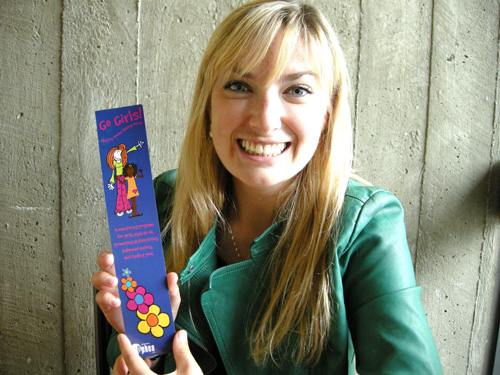
What happens to girls in their early teens? Younger girls tend to be exuberant and energetic, but many of them lose that self-confidence by age 12 or 13 and often drop out of sports or other activities they once loved.
“So many things come into play at that age to make life awkward,” says U of G student Kyly Whitfield. “I was lucky; I had two older sisters. When I needed my first bra, I just took one of theirs. If I fought with a friend at school, they were there to listen and give sisterly advice. But not all girls have someone like that in their lives.”
Knowing how important her sisters were to her in navigating through puberty and the early teen years, Whitfield is volunteering with the Big Brothers Big Sisters “Go Girls!” program in Guelph. It’s a mentoring program where two young volunteers between the ages of 18 and 25 work with groups of eight to 10 girls from grades 7 and 8.
Like other Big Brothers Big Sisters programs, Go Girls! is supported by the United Way of Guelph & Wellington.
“The girls who participate are chosen by guidance counsellors,” Whitfield says, who is working on her master’s degree in human health and nutritional sciences. “We meet with the girls once a week after school, and we do fun activities with them, make snacks and lead discussions. We focus on three areas: active living, balanced eating and feeling good.”
When she started, Whitfield wasn’t convinced that a seven-week program could make a significant difference. Now that she’s done it several times, she knows that it does. “You really connect with the girls,” she says. “You see them change. The shy ones come out of their shells. They ask the questions they’d be hesitant to ask their parents or teachers.”
One example of an activity that helps to spark discussion: “We have them make an Inside Me-Outside Me Box. Each girl starts with an empty box, then clips pictures and words from magazines to glue on both the inside and the outside. The outside represents how she is seen by others, and the inside is who she really is. Then we talk about why there are these differences and what they might mean.”
Some discussions are about how the girls’ bodies are changing, and others focus on social issues such as cliques at school, bullying on the playground, or how having a boyfriend affects your other friendships. “We create a really safe environment in the group, so that the girls know they can talk without worrying about being criticized or judged,” Whitfield says.
The active living portion of the program doesn’t emphasize organized sports, since those aren’t always as appealing to the girls as co-operative games are. “We do what they like,” says Whitfield. “Some love to dance, some love to skip. What’s important is to find an activity that they enjoy.”
Whitfield and the other mentors will also bring along healthy but less common foods, such as pomegranates, for the girls to try. “When we talk to them about nutrition, they often say that they just eat whatever is in the cupboard at home,” she explains, “so we encourage the girls to ask their parents if they can go grocery shopping with them. They can say, ‘hey, I tried a pomegranate at Go Girls, and it was good; could we buy some?’”
This is Whitfield’s third year with the program. “I signed up to do this rather than being a Big Sister because it is a lesser commitment. You can sign up one semester at a time, for just once a week for seven weeks.” But while the commitment is easier, saying good-bye to the girls she’s gotten to know can be tough. “There are a lot of tears and hugs at the end of the seven weeks,” she says.
Anyone interested in volunteering for this program should contact Kandice Seymour at kandice.seymour@bigbrothersbigsisters.ca.
Whitfield says there’s also a Go Guys! program for boys that urgently needs more young men to act as mentors.
Click here to view a video about Big Brothers Big Sisters of Guelph.